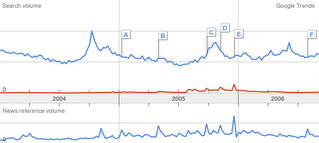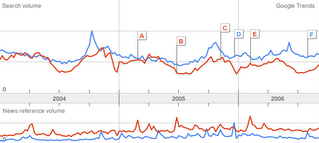
Google has a new tool in testing called Google Trends. This feature allows you to get some idea of the relative popularity of different search terms. So...I decided to compare some searches related to evolution: First is a comparison of relative search volume for evolution(blue) vs intelligent design(red).
Notice that in relative terms searches for evolution far outnumber searches for intelligent design since 2004. The lettered spots correspond to recent events in the Evolution/ID "controversy" . It is interesting that intelligent design seems to spike with significant news events in the "controversy" but not evolution does not.
I thought it would also be fun to compare search trends for Richard Dawkins and Michael Behe. Seems a fair comparison given the high esteem Behe is held in ID circles:

Again Dawkins(blue) as a search term well out ranks Behe. I searched for "Dawkins" ,"Behe", so some superfluous hits probably crept in.
By the way blip E for Behe is his Dover trial testimony.
Just for grins I compared the search trends for religion and evolution, mindful of the current discussions in the blogosphere. Evolution and religion are both popular search terms and they seem to be somewhat correlated (based on the human brain's great ability to see patterns where none exist).

Assuming these results can be trusted evolution is an encouragingly popular search term, on a par with religion as a search term. Further, the seeming correlation between them suggests that lots of people are interested in the relationship between evolution and religion.
Google cautions us that Trends uses only a sampling of the available data, but I think this is potentially a really useful tool for spotting data trends. So I am not going to take my trend results too seriously.
By the way, God handily beats Darwin but considering God has an elaborate and long running set of PR agencies in place this is not too suprising.

Geek that I am, I would love the ability to download time series data for time series analysis and correlational studies. But for now, play away!
No comments:
Post a Comment